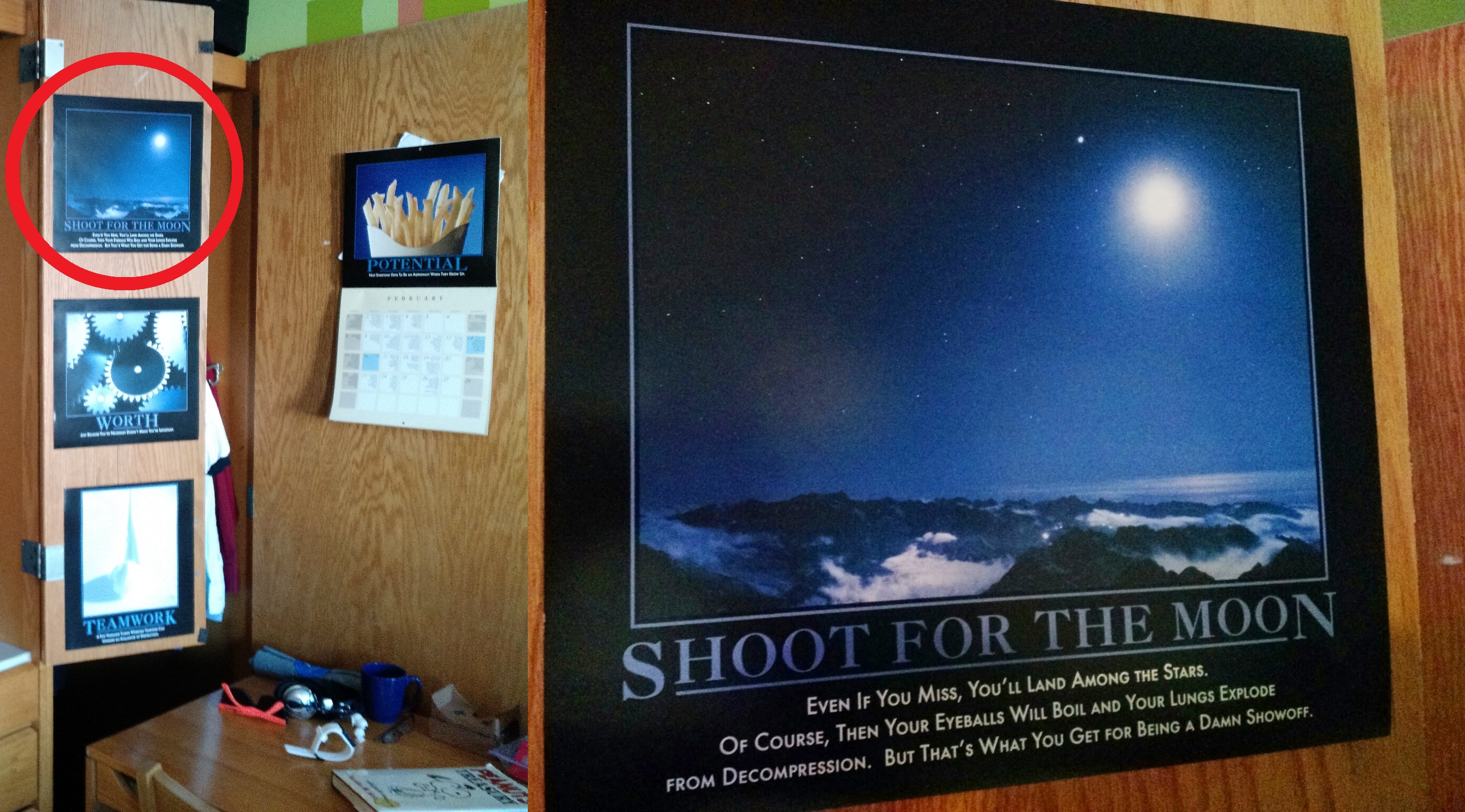Poker, Mountains, and Magic by Joel G. '18
The four words of this title have no other exact match on Google
Upon opening my closet this morning – brightly lit with glorious sunshine streaming through the frosted window – I was greeted with a beautiful, inspirational maxim:

Nearby were posted similar words of wisdom.

Clearly, I’m not a fan of trite platitudes. I got a collection of Demotivators for Christmas from someone who knows me far too well, and just finished redecorating my dorm room to constantly remind me of my insignificance whenever I might be at risk of feeling too hopeful. After all, “If a pretty poster and a cute saying are all it takes to motivate you, you probably have a very easy job. The kind robots will be doing soon.”
I hope to blog more about my room and the renovations it underwent (undergoed? undergoned? underleft?) over IAP, but in the meantime I’ll recap my January and preview my spring semester.
Last week I just finished 6.176, Pokerbots Competition, which was my only IAP course, aside from a Broomball class I dropped before ever attending. In Pokerbots, I worked with Jeff ‘18 and Casey ‘18 to build a computer program that plays poker (triplicate sit-n-go pot-limit Texas Hold’em, in case you were wondering) against other teams’ bots. We had biweekly lectures about poker theory, including a guest lecture from two-time World Series of Poker Champion Bill Chen, with application to computer science. Unlike Tic-Tac-Toe or Chess, poker is a game of incomplete information, which means that it’s impossible – even for computers – to determine what the best move is in any given scenario, since the “best move” depends on what cards your opponent is holding. Playing poker with a robot is like trying to play chess without knowing where your opponent’s pieces are.
This made the game rather interesting, since we had to tell our bot to guess at what cards the other bots held based on how aggressively they were betting (updating probability distributions of possible card combinations, in case you were wondering). Also interesting was the team dynamic, which, in typical MIT fashion, involved us procrastinating for 27 days before devolving into over-caffeinated insomniatic hackathon mode during which we coded most of the bot in the last 24 hours.
If there’s one thing that MIT has taught me, it’s a haunting, incessant awareness of exactly how far away all of my deadlines are.
Appropriately and affectionately, we named our program “struggleBot” and submitted it to the final tournament, the results of which will be released at an event next week. There are over $30,000 in prizes on the line, courtesy of trading companies interested in such things, so the stakes are surprisingly high. In reality, the closest my team will ever get to a cash prize is the 27 days we spent fantasizing about how we’d spend our respective $10,000 payoffs, but at least we get to sit in the same room as the real winners and eat free pizza.
Almost immediately after submitting struggleBot, I left on a weekend vacation to New Hampshire with the freshmen of Conner 3. We journey deep into the Misty White Mountains to an alpine skiing resort and spend two days alternating between wiping out and laughing at ourselves. But whether we were in the chair lift or falling out of it, the mountains were a beautiful view and a much-needed refresh before returning to campus to start the semester’s grind again.

Speaking of semester, I’ve decided to go out on an academic limb and take 5 classes. 8.02 (Electricity and Magnetism) and 6.01 (Intro to Computer Science) are obvious choices, as is 18.06 (Linear Algebra). My other two are far more interesting and slightly less technical: 21W.789 (Communicating with Mobile Technology) and MAS.S66 (Magic as Interface, Technology, and Tradition).
21W.789 is technically a humanities class, but its only project is to build a mobile app. Lectures are co-taught by Frank Bentley, who commutes from his job at Yahoo in San Francisco every Tuesday just to talk to us, and Ed Barrett, who started teaching this class ten years ago, when it was the first mobile app class in the nation. The course is able to slide by as a humanities because the focus is design process and usability, not coding. Designing mobile apps can be surprisingly artistic!
MAS.S66 hasn’t had its first lecture yet, but I’m irrepressably excited for it. As you may have noticed from my previous paragraph, I’m passionate about user interface design and theory. So when I received energetic announcements from multiple sources about a new Media Lab seminar about magic and its application to technology, I was quickly sold. I’ll let you appreciate its course description for yourself:
With a focus on the creation of functional prototypes and practicing real magical crafts, this class combines theatrical illusion, game design, sleight of hand, machine learning, camouflage, and neuroscience to explore how ideas from ancient magic and modern stage illusion can inform cutting edge technology. Students will learn techniques to improve the presentation, display, and interface of their projects as well as gaining a deeper understanding of the cultural traditions that shape user expectations of technology. Topics will include:
- Stage Illusion as Information Display
- The Neuroscience of Misdirection
- Magical Warfare: Camouflage and Deception
- Magic Items and the Internet of Things
- Computational Demonology
- Ritual Magick as User Experience Design
Guest lecturers and representatives of Member companies will contribute to select project critiques. Requires regular reading, discussion, practicing magic tricks, design exercises, a midterm project and final project.
Yes, my class requires practicing magic tricks. Also, a quick perusal of the 906 Google results for “Computational Demonology” (907 once I publish this post (so meta!)) indicates that, yes, we are the only university to offer this topic (in case you were wondering).
Anyways, I’ve got 8.02 homework calling me already, with a pile of interviews and field observations for 21W.789 due next week, and I can already feel the pressure building.
It’s good to be back.